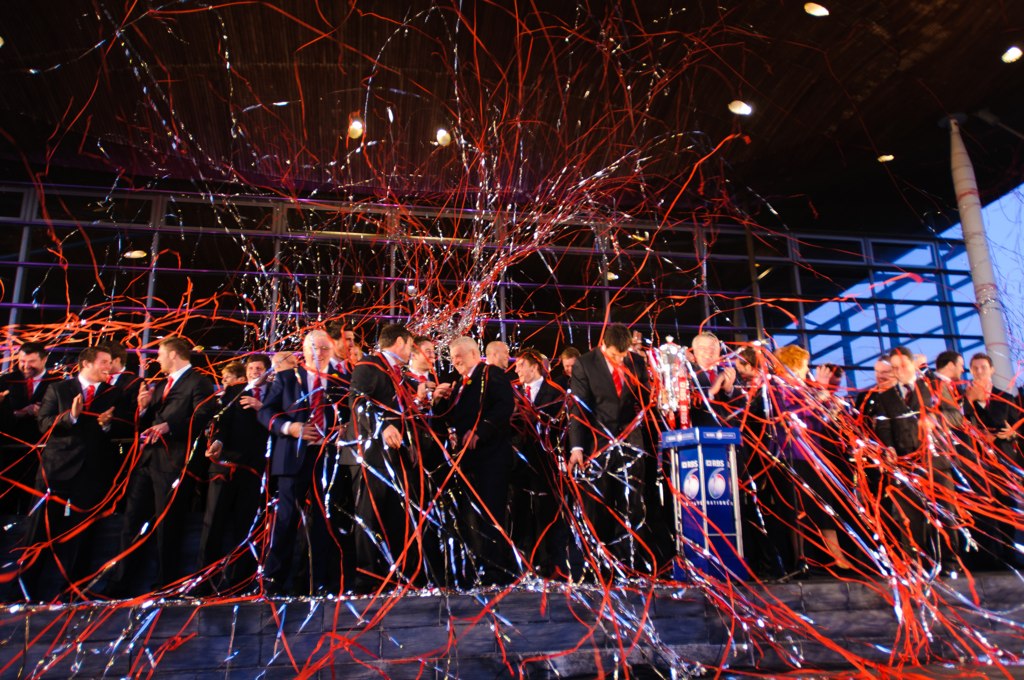 |
| Not for the first time, parliamentarians have got themselves entangled in a civil war. |
For more than a year (Welsh rugby : The dragon eating itself to death) , there's been an increasingly ugly battle between the Welsh Rugby Union (WRU) and the four professional regions for control of rugby union in Wales.
Yesterday, it reached the Senedd, with the Welsh Conservatives holding a debate on the issue. It focused on the financial future of Welsh rugby (as you might expect them to do), but AMs from all parties contributed - whether speaking for themselves or on behalf of constituents who are rugby fans.
Profiteers and Boneheads : How the civil war started
 |
| Ultimately, this. (Pic : The Guardian) |
Many reading this don't need me to go into the details, but I suppose I have to for posterity's sake. These are perhaps the main causes, but other sore points have bubbled away since professional regions were established in Wales.
The future of European club competitions – Since the English clubs agreed a new TV deal with BT, a new European club competition, the Rugby Champions Cup, has been proposed that would be run by clubs, not the union-backed ERC (who run the current Heineken and Amlin Cups).
It would address what the English and French consider "over-representation" of Pro12 sides, and ensure a "more equitable" funding arrangement split three-ways between the three top leagues (which, coincidentally, means more money for English and French clubs and a bit more for the Pro12).
The WRU are officially opposed to the Champions Cup (all northern hemispshere unions are), and want the regions to remain in the Pro12 and reformed ERC competitions. However, because the Welsh regions are a bit more independent of the WRU than the Irish provinces, but aren't English-style "clubs", the WRU's leash isn't as tight as the they might've hoped.
After the French were brought back into the ERC fold, the English clubs have openly courted the Welsh regions, taking advantage of their animosity towards the WRU, perhaps hoping the regions would break ranks within the Pro12 to prevent the Champions Cup idea flopping.
Control over the regional game – The regions are refusing to sign a revised ten year participation agreement with the WRU until 2019, which would bind them to the Pro12 and "official" European competitions. If they don't sign by the end of the current season, they could well find themselves without any competitive games. The regions have made it clear they would be prepared to break-away completely from WRU control and play in an expanded Aviva Premiership (Anglo-Welsh, possibly British league) and Champions Cup.
The WRU have, effectively, threatened to disband the regions and set up their own completely under their control – as the Irish provinces are to the IRFU.
Financial sustainability of the regions – One of the big reasons the regions are refusing to sign a participation agreement is money. The regions are often reliant on benefactors (including certain local authorities) to keep them afloat, and they can't compete with English and French clubs when it comes to paying top Welsh talent top wages. Pro12 games (except derbies) are poorly attended, though the Pro12 has signed a new TV deal with BSkyB. The regions also believe annual stipends from the WRU and compensation for international release are inadequate.
The WRU would prefer to use the £6million in international release compensation to centrally-contract senior players in order to stem the talent drain to England and France. However, this would undermine the regions' operational independence as stand-alone businesses and could be considered an attempt by the WRU to take control of the regions by stealth.
What our AMs said
 |
| AMs have backed calls for a formal committee inquiry into the governance and finances of Welsh rugby. (Pic : National Assembly) |
Shadow Sports Minister, Mohammad Ashgar (Con, South Wales East) kicked it off by underlining the economic importance of rugby, with the Millennium Stadium worth £130million and the four regions having a knock-on (excuse the pun) impact of £50million per year. He called for the Assembly to undertake an independent inquiry into the governance and finances of Welsh rugby, as they could act as "an impartial third-party broker". Byron Davies AM (Con, South Wales West) added that the regions employed up to 1,000 people.
Lynne Neagle AM (Lab, Torfaen) said mixing politics with rugby is a "tricky path to negotiate", adding that she doesn't want to take sides, hoping for a compromise. She also underlined how money has changed the sport and distanced it from communities.
Welsh Conservative leader, and keen rugby player, Andrew Davies (Con, South Wales Central), said "personalities are clouding the way forward", and any agreement needs "give and take from both sides" otherwise the "hemorrhaging of talent" would continue.
Plaid Cymru's spokesperson for sport, Bethan Jenkins AM (Plaid, South Wales West), said she's received "lots of correspondence on the issue", believing politicians can "bring people together and push for progress", and that they have an interest as public money has gone into the WRU. She outlined the background of the dispute, adding her support to a governance review, hoping grass-roots rugby would be included.
Peter Black AM (Lib Dem, South Wales West) said politicians should generally stay out of sport, but someone "needs to break the stalemate", saying fans were losing patience and interest, and that the regions are "holding the national game to ransom".
Mike Hedges AM (Lab, Swansea East) described the current regional set up as "a mess", rejecting the concept of regions, noting a big gap in quality between professional and club level. Mick Antoniw AM (Lab, Pontypridd) reiterated the importance of clubs and local identity, criticising the absence of professional rugby in the valleys.
Culture Minister John Griffiths (Lab, Newport East) said it's up to AMs to decide if a committee inquiry is required, and calls for an inquiry were repeated by Bethan Jenkins and Darren Millar AM (Con, Clwyd West), with the latter saying a formal request has gone in to the Communities, Equality and Local Government Committee.
AMs unanimously passed the motion without amendment.
The First Minister has since told BBC Wales he's offered to mediate the dispute in private, as fans "want to see an end to this now."
Where's this going?
Both sides are still talking, but there's no end in sight (for now).
If the WRU "win", the future could look similar to Ireland or New Zealand. I doubt the WRU would go as far as disbanding the regions, but they would certainly bring in central contracts. Welsh regions would remain in the Pro12 and competitions officially sanctioned by the ERC and IRB (like the Heineken Cup). Barring agreement with the unions, the Champions Cup would be dead.
The men's national team would be the biggest game in town, and the structure of the Welsh game would remain set up to provide an international conveyer belt. I suspect problems of lack of interest, poor performances in Europe and lack of money at regional level would continue, eventually culmanating in the disbanding of one or two of the regions for financial reasons.
If the regions "win", the future could look similar to English football's Premier League. The sums of money dangled in front of clubs by BT has never happened in rugby before, and it's an attempt by BT to do to European rugby what BSkyB did for football - in effect creating rugby's equivalent of both the English Premier League and UEFA Champions League.
In the face of poor attendances and poor finances in the Pro12, the prospect of playing English clubs regularly and making more money doing so has - quite understandably - turned the regions' heads. The Six Nations could slowly die off as the premier event in the northern hemisphere, replaced with higher intensity, higher stakes club games.
With bigger TV deals, the regions might become more self-sustaining whilst retaining their operational independence. I don't see that being good in the long run though. The Welsh regions will still struggle to remain competetive with French clubs backed by wealthy benefactors. The talent drain could become worse as a football-style transfer market develops, but it could also leave the regions open to takeover by rugby's equivalent of Roman Abramovitch or Sheikh Mansour.
Unless that happens, the regions – although playing in more exciting competitions – would be feeders for English and French clubs, like how the Dutch, Portuguese and Belgian leagues are to England and Spain in football.
Note to AMs : Don't make it worse!
 |
| Are AM "pudels" playing a dangerous game by getting involved? I also suspect this won't be the first, or last, time rugby and politics will mix. (Pic : learnearnandreturn.wordpress.com) |
Like science; mixing sport with politics is combustable, often resulting in nasty burns to politicians hands.
I realise AMs are eager to get involved in a high-profile schism within one of the "Welsh state churches", but a full-blown inquiry – that could last up to a year - into what's ultimately an internal matter is a no-no in my opinion. The previous football ones weren't related to governance, but sports participation and the state of the sport generally.
If there's a sporting issue that urgently requires AMs attention, it's the possible illegal state aid granted to Llanelli Scarlets and the Swansea clubs by Carmarthenshire and Swansea councils.
Politicians, however, have a duty to represent constituents' interests. This straddles the line between something AMs should keep their noses out of and something that deserves to be debated in the Senedd. They've had their debate, and that should be enough, while the First Minister's offer of private talks should be taken seriously. That's as far as political involvement should go.
Having said that, this is a political problem - not anything to do with performance.
It's hard to find fault with how the Welsh national team have performed over the last decade, or the WRU's own financial performance either. Like it or not, they're a well-oiled machine.You can't say the same of the regions, but that's the bread and butter of Welsh rugby and where the players, ultimately, make their living. One can't exist without the other.
We'll have to wait and see how this row affects performances in the forthcoming Six Nations, but seeing how so many internationals earn their crust outside Wales, I doubt it would have an impact.
Whilst on the subject of politics - and feeling cheeky - putting you in charge of a high-profile public initiative, commission or committee is the Welsh establishment's way of making you a made man (or woman). If there's anyone being groomed for a parachute drop into a safe seat it's not the Kinnock boy, it's Roger Lewis.















0 comments:
Post a Comment